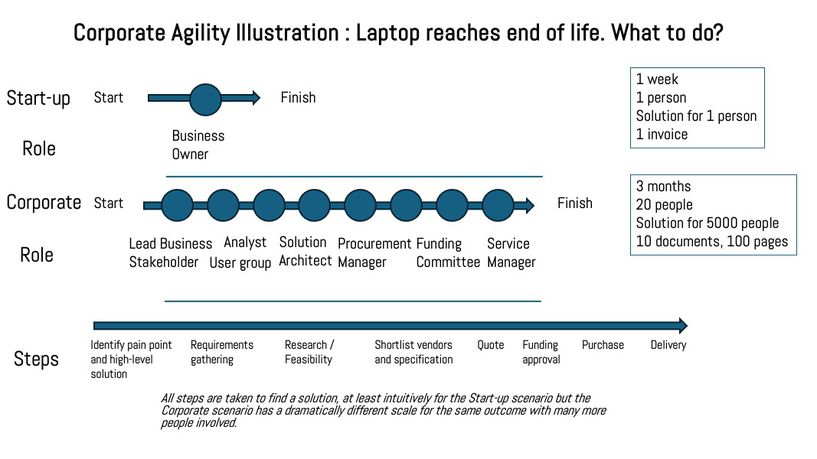A couple of questions:
How long does it take to onboard a new team member?
How many people do you need to make a decision? How long does it take?
As the number of people in an organisation grows, one benefit is that the number of roles you perform decreases as that responsibility is now delegated. On the flip side, however, more people have those roles, each with something to say about whatever topic you need to progress. So the number of meetings goes up, meaning you have less time to actually "do" something. Any of those people in the information chain has a veto or an out-of-office response, and the whole thing grinds to a halt. On top of that, adding new policies, new legislation, different file formats, sickness or absence, and requirements to use a new system, and suddenly getting something as simple as getting a purchase order approved becomes a Herculean task of administration.
The days of a small, slick company getting things done quickly or pivoting to a new business model are long gone as your company has scaled and grown into a much larger, sticky corporate company. I have started and grown companies and worked in every size of company up to global corporates, so I've tried a few different tactics in trying to get things done, and I have a few lessons learnt:
Getting stuff done slows down the more people you add to the process. It's inevitable.
Information passes from one brain to another at the speed of talking or reading, despite living in a hyper-connected digital world (still)
The more people you add to the decision-making process, the more opinions on the decision increase, and inevitably, the more time it takes to make the decision.
Just because you've said something or sent a message doesn't mean you can assume they understand or even read it.
The higher up the organisation you go, the more you need to work through people and across teams.

So you need to get stuff done. What levers do you have?
Understand the culture you work in. Key questions to ask: How risk-averse is it? What are the preferred forms of communication and styles of engagement? What is the attitude towards accountability and delegation of responsibility? Is it career suicide if a bad decision is made? The point is that you, by yourself, are not going to change the company. You'll have to work with what you have.
Be clear in your communication. To cut through the noise, Have a "Value Proposition" or a clear statement of what you want to achieve.
Use a variety of communication approaches. Ensure you engage people (make it two-way) and respond positively to feedback.
Improve your Influence and persuasion skills. Recognise people's personal agendas, appeal to them, and engage with them in a way that will increase their likelihood of responding.
Establish trust. Be consistent in how you act and what you communicate. Ensure that action and communication align with the values of the team and company you are working in. Demonstrate "good" politics by putting the team first instead of your selfish interest. Be transparent and accountable when things are not going according to plan, and if they are not going to plan, find ways to make it right.
When disagreeing with someone, identify what you disagree about - is it the method? The principle? the objective? The facts? Correctly identifying the issue can save considerable dispute and time.
Know the key influencers in the decision-making process and understand the quality of your relationship with them.
Final thoughts: Getting stuff done is done through people, and the quality of your relationships measures that. So, as you move up the organisation and across teams, whatever the processes or the automation, there's still a human on the other end who has to push a button or agree to a proposal.